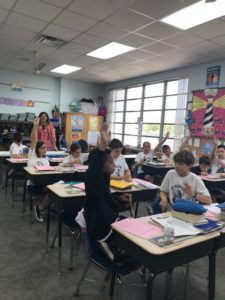
For the 10th year in a row, Florida’s most disadvantaged students are making solid academic gains using the Florida Tax Credit Scholarship, the nation’s largest private school choice program, according to the latest annual evaluation of standardized test results.
The evaluation report for the 2016-17 school year, published Tuesday by the Florida Department of Education, is the 10th to measure academic progress, as required by state law. The latest report is the fourth from researchers at the Learning Systems Institute at Florida State University. Prior studies were conducted by David Figlio at the University of Florida and Northwestern University.
Since the 2006-07 school year, tax credit scholarship students have been required by state law to take one of several state-approved standardized tests if they’re in the same grades where testing is required for public school students. The results over that span have been remarkably consistent.
The new report examined the test scores of 55,148 eligible students during the 2016-17 school year to compare with past performance.
As a whole, and despite numerous disadvantages, students using the tax credit scholarship stop losing ground compared to their more advantaged peers and, in layman’s terms, gain a year’s worth of growth in a year’s time.
“New FTC students in 2016-17 … were relatively more disadvantaged and lower-performing prior to entering the FTC program,” wrote the researchers. “Moreover, they were more likely to come from low performing schools and less likely to be high performing students in their prior public schools before attending the program.”
Yet once on the scholarship, the students “maintain his or her relative position in comparison with all students nationally in both reading and math.”
According to the researchers, 22.9 percent of scholarship students came from public schools rated “D” or “F” in the prior school year.
It’s worth noting, though, that 30.3 percent of students came from public schools receiving an “A” or “B,” suggesting that while a school may work well for one student it may not be a good fit for another.
Researchers also found that students who continued to struggle once on the scholarship were more likely to return to public schools. Researchers did not attribute this lower performance to the scholarship program. In the 2013 report, Figlio noted “returning students are generally particularly struggling students.”
The report also examined the impact of individual private schools on scholarship student gain scores over a three-year period. Researchers compiled gain scores for 342 private schools with test scores for 30 or more scholarship students in both the 2015-16 and 2016-17 school year.
That’s up from 283 schools last year, and 198 the year before.
Sixty-two of the 342 schools had combined math and reading scores that were statistically significant and negative. Thirty-one schools had combined scores that were statistically significant and positive.
Because private schools participating in the scholarship program use national norm-referenced tests and public schools use the criterion referenced Florida Standards Assessment, a comparison between scholarship students and Florida public school students cannot be made.
However, comparisons were made in the annual evaluations from 2010 to 2012 when the prior state test, the Florida Comprehensive Assessment Test, included a norm-referenced component. In those years, scholarship students slightly outperformed their public school peers, but the results were only statistically significant for one of the three years.
The Florida Tax Credit Scholarship is administered by Step Up For Students, which co-hosts this blog. Prior academic evaluations can be found on the Florida Department of Education website.



greetings
My Name is Marilu Clement from Children’s Kingdom Academy in Orlando fl. 32809 i would like to have information for small centers who provide VPK in orange county. We also work with ASP (After School program ) with Elementary children who needs help with Literacy and homework as well.